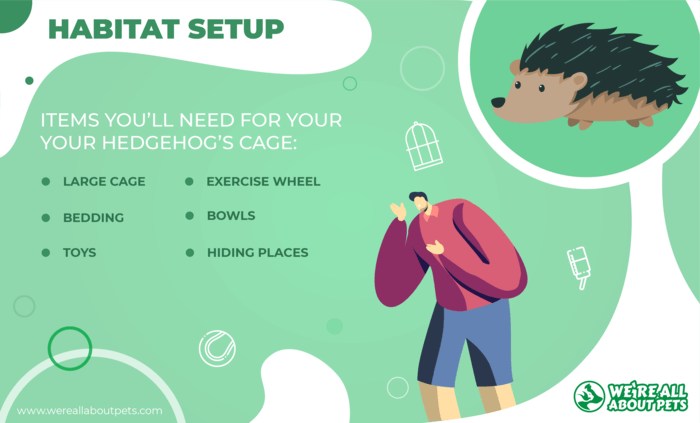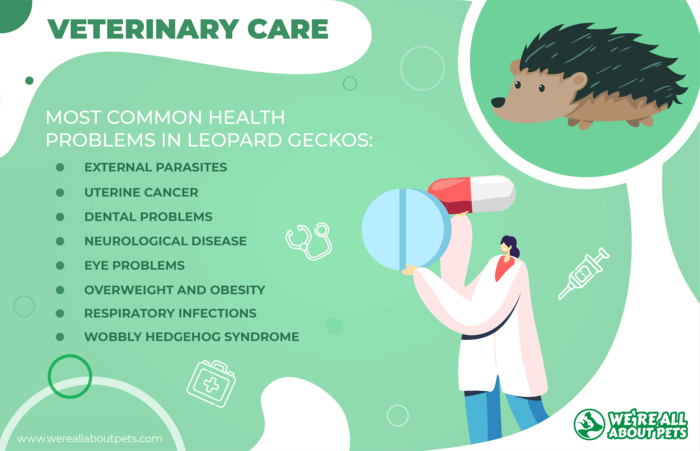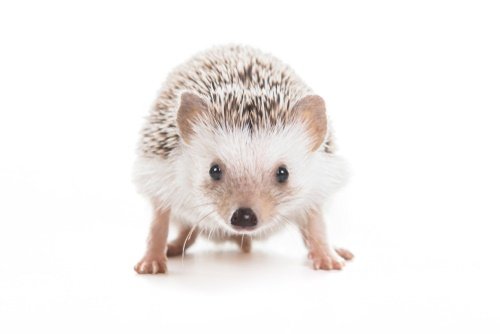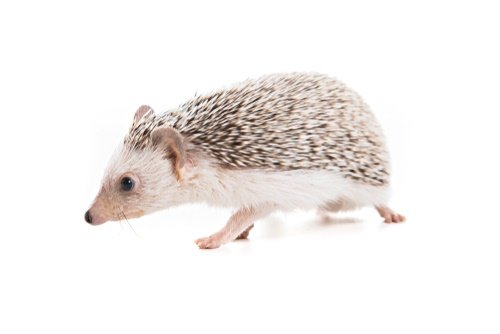How To Care For A Hedgehog?
This page contains affiliate links. We may earn money or products from the companies mentioned in this post through our independently chosen links, which earn us a commission. Learn More

General Stats:
- Pet Type: Small pet
- Size: 5 to 8 inches
- Diet: Insectivore
- Lifespan: Up to 10 years
Though they may look a bit intimidating with all those spikes, hedgehogs are actually quite friendly and fairly easy to tame. Affectionately called the “hedgie” by many hedgehog owners, the hedgehog is a popular exotic pet that can live up to 10 years with proper care.
Here’s what you need to know about caring for a pet hedgehog.
Quick Navigation
Habitat Setup For Hedgehogs

The first thing you need to know about hedgehogs is that they are solitary animals.
In the wild, hedgehogs don’t spend any time socializing except for breeding purposes. This means you’ll only need to plan to keep one hedgehog when it comes to setting up a cage.
Here are some of the items you’ll need for your hedgehog’s cage:
- Large Cage – Your hedgehog cage should offer at least 2.5 to 4 square feet of space so your pet has plenty of room to roam freely.
- Bedding – Aspen wood shavings are great for hedgehogs because they absorb liquid and are very affordable. You can also go with fiber bedding which is great for burrowing.
- Toys – The hedgehog is a very playful animal, so provide plenty of toys as well as structures your hedgehog can climb on and play with.
- Exercise Wheel – Hedgehogs are very active, running up to 12 miles a night if given the chance. Make sure your pet has an exercise wheel to help him stay healthy.
- Bowls – Food and water bowls are a must for hedgehogs, or any small pet. Some owners prefer a water bowl, but these are easily contaminated so water bottles are recommended.
- Hiding Places – Because hedgehogs are nocturnal, your pet will need a good hiding spot to sleep in during the day. A plastic igloo or something similar works well.
In many cases, pet store cages designed for guinea pigs will also work for a hedgehog.
Just avoid any cage that has a wire bottom because it could hurt your pet’s feet. The cage should retain some heat to keep your hedgehog warm but still needs some ventilation as well. Cages with a solid bottom and wire top tend to work very well.
Your hedgehog will spend most of its time in its cage but be sure to give your pet plenty of daily attention as well. The more time you spend handling your hedgehog, the tamer it will become.
Hedgehog Diet

Wild hedgehogs are insectivores by nature. This means that insects make up the majority of a hedgehog’s natural diet. In captivity, you can feed your hedgie a variety of different insects or you can rely on a nutritionally balanced hedgehog food.
Here are some quick facts about the ideal hedgehog diet:
- Hedgehogs have high needs for protein – your pet’s diet should consist of about 30% protein.
- In addition to protein, your hedgehog needs a certain amount of chitin in his diet which comes from insects – it provides similar benefits to dietary fiber.
- Because hedgehogs don’t tend to move very fast, they don’t require a lot of fat in their diet – a diet too high in fat puts your hedgehog at risk for obesity.
- Commercial hedgehog kibble should be supplemented with live or freeze-dried insects for nutritional variety – you can also feed small amounts of cooked lean meat.
- Supplement your hedgehog’s diet with small amounts of fresh peeled fruit and cooked low-starch veggies (like green beans and squash).
Balanced nutrition is important for your pet hedgehog, as it is for any pet.
For that reason, it’s not a good idea to feed your pet kibble formulated for other animals.
Ferret food and dry cat food won’t provide the optimal blend of nutrients. If you’re concerned about meeting your hedgehog’s nutritional needs, consider commercial hedgehog food supplemented with fresh or dried insects.
In addition to food, be sure to provide your pet with unlimited access to fresh water as well. A small pet water bottle is perfectly adequate. Just be sure to clean it and refill it on a daily basis.
Also Read: What Do Hedgehogs Eat?
Hedgehog Veterinary Care

You should plan to take your new pet to the veterinarian within a few weeks of bringing your hedgehog home. It’s important to establish a baseline so you can keep track of developing health issues and bring them up to your vet as early as possible.
With proper care, you may be able to enjoy your hedgehog’s company for up to 10 years.
The quality of your pet’s nutrition plays a key role in determining his health and lifespan, so feed your pet the highest quality hedgehog diet you can afford. You should also educate yourself on potential health issues.
Here are some of the most common health problems in hedgehogs:
- External parasites
- Uterine cancer
- Dental problems
- Neurological disease
- Eye problems
- Overweight and obesity
- Respiratory infections
- Wobbly hedgehog syndrome
Most veterinarians aren’t trained to care for exotic pets, so you may need to find a specialty vet to care for hedgehog.
Plan to spend about $45 per visit. Bloodwork, fecal exams, and other testing will cost extra and may be recommended on an annual basis.
Though they may not cost as much as owning a cat or dog, hedgehogs can be a little more expensive than other small critters. To help cover the cost to keep your hedgehog, you might consider pet insurance.
Pet insurance is definitely an option, but you have to ask yourself if it’s worth the cost.
Many companies don’t cover exotic pets and, if they do, you may end up spending more on the premium than you would to cover the treatment yourself. You may be better off putting that money in savings, just in case.
Hedgehog Fun Facts

- Hedgehogs are nocturnal which means they tend to sleep (often curled up in a ball) during the day and can become very active at night.
- In the wild, hedgehogs typically hibernate between October and April, though they may be active well into December if the weather stays mild.
- Baby hedgehogs are called hoglets – female hedgehogs are pregnant for an average of 30 to 40 days and give birth to 4 to 5 babies per litter.
- The average lifespan of a wild hedgehog is only 2 to 3 years but, with proper care, pet hedgehogs can live up to 10 years in captivity.
- Pet hedgehogs are fairly gentle and they can be easy to tame which makes them great pets – few hedgehog owners have trouble with biting them.
- Because they are insectivores, hedgehogs have canine teeth just like humans – they have up to 44 teeth which start to grow in as young as 3 weeks of age.
- Hedgehogs tend to be fairly clean pets but sometimes need a bath – you can bathe your hedgehog in the sink with lukewarm water and baby shampoo.
If you’re considering an exotic pet, the hedgehog might be one to consider. These prickly pets are fairly easy to tame and they generally don’t require any specialized care, aside from their unique diet.
Before you choose a pet, just be sure you can cover the costs and try to give your pet the best care possible.
Frequently Asked Questions
How long do hedgehogs live?
Pet hedgehogs live up to 10 years in captivity, though their average lifespan is closer to 4 to 6 years.
How much do hedgehogs cost?
Priced between $150 and $300 each, hedgehogs cost more than many small pets like guinea pigs and gerbils. In addition to the cost of your new pet, you should be prepared to spend $50 to $150 on a cage and another $50 on supplies. Monthly costs for hedgehogs average under $50 but you also need to factor in occasional costs for veterinary care and various treatments, when needed.
How big do hedgehogs get?
Some people refer to hedgehogs as an exotic pet while others put them in the category of small pets (like hamsters or guinea pigs). Either way, the hedgehog is a small animal that grows 5 to 8 inches long.
What do hedgehogs eat?
Hedgehogs are considered insectivores which means they feed primarily on insects. Mealworms and crickets are some of the most popular insects for a pet hedgehog, but these pets need a varied diet to ensure balanced nutrition.
Are hedgehogs good pets?
With regular handling, hedgehogs are fairly easy to tame and hedgehog care is pretty straightforward. The biggest challenge is their insectivorous diet, though choosing a commercial hedgehog food can help you make sure your pet gets the nutrients it needs.
Are hedgehogs messy?
The hedgehog is generally a pretty clean pet, but some have a tendency to relieve themselves while running on their exercise wheel which can create a bit of a mess. As long as you clean the cage regularly, you shouldn’t have to worry about odor. You may even be able to train your hedgehog to use a litter box.
Where do hedgehogs come from?
Most hedgehogs kept as pets are African pygmy hedgehogs which are native to Africa but are technically a hybrid of two different species – the Algerian hedgehog and the four-toed hedgehog.
Do hedgehogs bite?
Hedgehogs are not known for being aggressive and they rarely bite people. If your hedgehog bites, it may be a sign that you’re hurting him or scaring him somehow.
Do hedgehogs sleep?
The hedgehog is a nocturnal animal which means these pets sleep during the day and are active at night. Hedgehogs typically sleep curled up in a ball for protection.
How long are hedgehogs pregnant for?
Unlike humans, female hedgehogs don’t have a monthly cycle so they can be bred at any time. Hedgehogs are pregnant for an average of 30 to 40 days and have litters of 4 to 5 hoglets.








